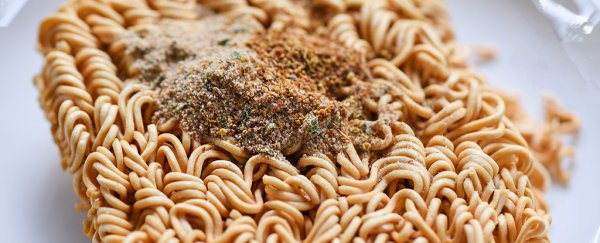The myth that monosodium glutamate (MSG) is somehow bad for you is one of those food misconceptions that just. Won't. Die.
Objections to this chemical range from the vague, arm-waving "unhealthy" label all the way to it being a damaging neurotoxin that makes you addicted to fast food.
It seems that no matter how many times experts communicate the truth about this harmless food additive, you'll still find plenty of savoury snacks and instant ramen in your local grocery store boasting their "MSG-free" status.
Which is why even in 2019, the latest YouTube video released by Canadian dietitian Abbey Sharp is as relevant as ever. In less than 15 minutes, she breaks down a bunch of total nonsense about MSG, explaining the science in a simple, engaging manner.
Sharp's video is actually a response to a 2008 viral video "The Truth about MSG", in which chiropractor and nutritionist Vincent Bellonzi makes a series of scientific-sounding claims on how MSG is a toxin that "excites the reward system", makes people fat and unable to control their emotions, and much more.
(Spoiler alert: none of that is true.)
As a quick recap, here's what you need to know about MSG. Naturally occurring in many protein-rich foods is glutamic acid, a chemical widely used by living organisms to make proteins in the body.
When you dissolve this acid or one of its salts in water, you end up with negative ions called glutamates, responsible for that savoury umami flavour. Classic examples of naturally glutamate-rich foods are canned tomatoes, soy sauce, and aged cheese.
MSG attackers will claim it's not the same as the 'natural' stuff, but this is false: when dissolved, on a chemical level the flavour-enhancing action of MSG is exactly the same as that of the 'natural' glutamate in, say, tomato sauce.
Other nonsense levelled at MSG involves claims that it messes with your brain chemistry. While glutamate is a neurotransmitter, just because you eat it doesn't mean it will go straight to your brain.
"Sounds a little bit like this guy got his facts mixed up," Sharp says in response to the idea that MSG is a neurotoxin.
Her video is well worth your time, so we'll let her explain in detail the evidence that shows MSG doesn't cross the blood-brain barrier, doesn't make you fat, nor does it make autism symptoms worse or give you crippling headaches.
Sharp also touches on the highly problematic "Chinese restaurant syndrome" myth, and even mentions how MSG can be used for good - by enhancing the appetites of elderly folks whose taste perception has diminished over time.
In fact, if you sprinkle a little bit of MSG on the food you make at home, you might be able to cut back on your salt intake - something worth considering if you're worried about your sodium consumption.
You can watch Sharp's full video and find the studies she cites linked here.
